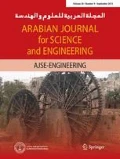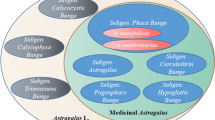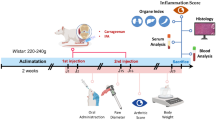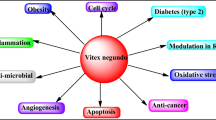Abstract
Cardiotoxicity from long-term use of the anticancer drug, doxorubicin (DOX), imposes a strict limitation its administration. The health benefits of avocado seeds (AS) stem from essential nutrients and phytochemicals. This study aimed to compare effects of ethanol (EAS), and water (WAS) extracts from AS on DOX-induced cardiotoxicity. Forty adult male albino rats were divided into four groups: GI were control rats. GII rats received DOX alone over a 2 week period. GIII animals received the DOX treatment plus AS. GIV rats received the DOX treatment plus EAS. AS extract treatments were administered after initiation of cardiotoxicity. Total flavonoids, polyphenols, and antioxidant capacity of both AS extracts were measured. Serum markers of cardiac dysfunction were evaluated, oxidative stress and inflammatory biomarkers were measured in cardiac tissue homogenates and histopathology of heart tissues was evaluated. The AS ethanolic extract had a higher content of active compounds. DOX treatment increased markers of cardiac dysfunction Matrix Metalloproteinase-1 (MMP-1), Serum Cardiac Troponin I (cTnI), Lactate Dehydrogenase (LDH), Serum Creatine Kinase Isoenzyme-MB (CK-MB), and Heart-Type Fatty Acid-Binding Protein (FABP3) and produced increases in levels of Advanced Oxidation Protein Products (AOPP) and Malondialdehyde (MDA) in cardiac tissue homogenates with a significant reduction in Catalase (CAT), Total Antioxidant Capacity (TAC). It also increased levels of Tumor Necrosis Factor (TNF-a), Interleukin-6 (IL-6), Interleukin-1 beta (IL-1ß) and Caspase-3, in the cardiac tissue homogenates. EAS was more effective than WAS, but both acted as cardioprotective agents following DOX treatment as evidenced by mitigation of impacts on biochemical markers.




Similar content being viewed by others
References
Zhao, C.-N.; Meng, X.; Li, Y.; Li, S.; Liu, Q.; Tang, G.-Y.; Li, H.-B.: Fruits for prevention and treatment of cardiovascular diseases. Nutrients 9(6), 598 (2017)
Morais-Silva, G.; Costa-Ferreira, W.; Gomes-de-Souza, L.; Pavan, J.C.; Crestani, C.C.; Marin, M.T.: Cardiovascular outcomes related to social defeat stress: new insights from resilient and susceptible rats. Neurobiol. Stress 11, 100181 (2019)
Haimeur, A.; Meskini, N.; Mimouni, V.; Ulmann, L.; Messaouri, H.; Pineau-Vincent, F.; Abouakil, N.; Tremblin, G.: A comparative study on the effect of argan oil versus fish oil on risk factors for cardio-vascular disease in high-fat-fed rats. Nutrition 57, 32–39 (2019)
Olagunju, H.T.; Oruambo, I.F.; Oyelowo, H.O.; Obediah, G.A.: Effects of some selected solvent extracts of avocado pear (Persea americana) on cholesterol/HDL ratio in albino rats. J. Global Biosci. 6(8), 5205–5211 (2017)
Shaker, R.A.; Abboud, S.H.; Assad, H.C.; Hadi, N.: Enoxaparin attenuates doxorubicin induced cardiotoxicity in rats via interfering with oxidative stress, inflammation and apoptosis. BMC Pharmacol. Toxicol. 19(1), 1–10 (2018)
Al-Taee, H.; Azimullah, S.; Meeran, M.N.; Almheiri, M.K.A.; Al Jasmi, R.A.; Tariq, S.; Khan, M.A.; Adeghate, E.; Ojha, S.: β-caryophyllene, a dietary phytocannabinoid attenuates oxidative stress, inflammation, apoptosis and prevents structural alterations of the myocardium against doxorubicin-induced acute cardiotoxicity in rats: an in vitro and in vivo study. Eur. J. Pharmacol. 858, 172467 (2019)
Hosseini, A.; Sahebkar, A.: Reversal of doxorubicin-induced cardiotoxicity by using phytotherapy: a review. J. Pharmacopuncture 20(4), 243 (2017)
Yu, J.; Wang, C.; Kong, Q.; Wu, X.; Lu, J.-J.; Chen, X.: Recent progress in doxorubicin-induced cardiotoxicity and protective potential of natural products. Phytomedicine 40, 125–139 (2018)
Xiong, C.; Wu, Y.Z.; Zhang, Y.; Wu, Z.X.; Chen, X.Y.; Jiang, P.; Guo, H.C.; Xie, K.R.; Wang, K.X.; Su, S.W.: Protective effect of berberine on acute cardiomyopathy associated with doxorubicin treatment. Oncol. Lett. 15(4), 5721–5729 (2018)
Melo, MFFTd; Pereira, D.E.; Moura, RdL; Silva, EBd; Melo, FALTd; Dias, CdCQ; Silva, MdCA; Oliveira, MEGd; Viera, V.B.; Pintado, M.M.E.: Maternal supplementation with avocado (Persea americana Mill.) pulp and oil alters reflex maturation, physical development, and offspring memory in rats. Front. Neurosci. 13, 9 (2019)
Popenoe, W.; Zentmyer, G.: Early history of the avocado. Calif. Avocado Soc. Yearbook 47, 19–24 (1963)
Bhuyan, D.J.; Alsherbiny, M.A.; Perera, S.; Low, M.; Basu, A.; Devi, O.A.; Barooah, M.S.; Li, C.G.; Papoutsis, K.: The odyssey of bioactive compounds in avocado (Persea americana) and their health benefits. Antioxidants 8(10), 426 (2019)
Sánchez-Albarrán, F.; Salgado-Garciglia, R.; Molina-Torres, J.; López-Gómez, R.: Oleosome oil storage in the mesocarp of two avocado varieties. J. Oleo Sci. 68(1), 87–94 (2019)
Uchenna, U.E.; Shori, A.B.; Baba, A.S.: Inclusion of avocado (Persea americana) seeds in the diet to improve carbohydrate and lipid metabolism in rats. Rev. Argent. Endocrinol. Metab. 54(3), 140–148 (2017)
Wang, L.; Bordi, P.L.; Fleming, J.A.; Hill, A.M.; Kris-Etherton, P.M.: Effect of a moderate fat diet with and without avocados on lipoprotein particle number, size and subclasses in overweight and obese adults: a randomized, controlled trial. J. Am. Heart Assoc. 4(1), e001355 (2015)
Mahmassani, H.A.; Avendano, E.E.; Raman, G.; Johnson, E.J.: Avocado consumption and risk factors for heart disease: a systematic review and meta-analysis. Am. J. Clin. Nutr. 107(4), 523–536 (2018)
Lara-Márquez, M.; Báez-Magaña, M.; Raymundo-Ramos, C.; Spagnuolo, P.A.; Macías-Rodríguez, L.; Salgado-Garciglia, R.; Ochoa-Zarzosa, A.; López-Meza, J.E.: Lipid-rich extract from Mexican avocado (Persea americana var. drymifolia) induces apoptosis and modulates the inflammatory response in Caco-2 human colon cancer cells. J. Funct. Foods 64, 103658 (2020)
Anthony Cemaluk, C.E.: Effect of ethanolic extract of avocado pear (Persea americana) seed on normal and mono-sodium glutamate-compromised rats’ kidney histology and serum bio-functional parameters. EC Pharmacol. Toxicol. 4, 271–284 (2017)
Arafa, M.H.; Mohammad, N.S.; Atteia, H.H.; Abd-Elaziz, H.R.: Protective effect of resveratrol against doxorubicin-induced cardiac toxicity and fibrosis in male experimental rats. J. Physiol. Biochem. 70(3), 701–711 (2014)
Arnous, A.; Makris, D.P.; Kefalas, P.: Effect of principal polyphenolic components in relation to antioxidant characteristics of aged red wines. J. Agric. Food Chem. 49(12), 5736–5742 (2001)
Joyeux, M.; Lobstein, A.; Anton, R.; Mortier, F.: Comparative antilipoperoxidant, antinecrotic and scavanging properties of terpenes and biflavones from Ginkgo and some flavonoids. Planta Med. 61(02), 126–129 (1995)
Brand-Williams, W.; Cuvelier, M.-E.; Berset, C.: Use of a free radical method to evaluate antioxidant activity. LWT-Food Sci. Technol. 28(1), 25–30 (1995)
El-Sayyad, H.I.; Ismail, M.F.; Shalaby, F.; Abou-El-Magd, R.; Gaur, R.L.; Fernando, A.; Raj, M.H.; Ouhtit, A.: Histopathological effects of cisplatin, doxorubicin and 5-flurouracil (5-FU) on the liver of male albino rats. Int. J. Biol. Sci. 5(5), 466 (2009)
Sodano, F.; Cavanagh, R.J.; Pearce, A.K.; Lazzarato, L.; Rolando, B.; Fraix, A.; Abelha, T.F.; Vasey, C.E.; Alexander, C.; Taresco, V.: Enhancing doxorubicin anticancer activity with a novel polymeric platform photoreleasing nitric oxide. Biomater. Sci. 8(5), 1329–1344 (2020)
Wang, W.; Bostic, T.R.; Gu, L.: Antioxidant capacities, procyanidins and pigments in avocados of different strains and cultivars. Food Chem. 122(4), 1193–1198 (2010)
Goudarzi, M.; Fatemi, I.; Siahpoosh, A.; Sezavar, S.H.; Mansouri, E.; Mehrzadi, S.: Protective effect of ellagic acid against sodium arsenite-induced cardio-and hematotoxicity in rats. Cardiovasc. Toxicol. 18(4), 337–345 (2018)
Bhatia, P.M.; Daniels, L.B.: Highly sensitive cardiac troponins: the evidence behind sex-specific cutoffs. J. Am. Heart Assoc. 9(10), e015272 (2020)
Ruggeri, C.; Gioffré, S.; Achilli, F.; Colombo, G.I.; D’Alessandra, Y.: Role of microRNAs in doxorubicin-induced cardiotoxicity: an overview of preclinical models and cancer patients. Heart Fail. Rev. 23(1), 109–122 (2018)
Ye, X.-D.; He, Y.; Wang, S.; Wong, G.T.; Irwin, M.G.; Xia, Z.: Heart-type fatty acid binding protein (H-FABP) as a biomarker for acute myocardial injury and long-term post-ischemic prognosis. Acta Pharmacol. Sin. 39(7), 1155–1163 (2018)
Priscilla, D.H.; Prince, P.S.M.: Cardioprotective effect of gallic acid on cardiac troponin-T, cardiac marker enzymes, lipid peroxidation products and antioxidants in experimentally induced myocardial infarction in Wistar rats. Chem. Biol. Interact. 179(2–3), 118–124 (2009)
Wu, R.; Yao, P.A.; Wang, H.L.; Gao, Y.; Yu, H.L.; Wang, L.; Cui, X.H.; Xu, X.; Gao, J.P.: Effect of fermented Cordyceps sinensis on doxorubicin-induced cardiotoxicity in rats. Mol. Med. Rep. 18(3), 3229–3241 (2018)
Osataphan, N.; Phrommintikul, A.; Chattipakorn, S.C.; Chattipakorn, N.: Effects of doxorubicin-induced cardiotoxicity on cardiac mitochondrial dynamics and mitochondrial function: insights for future interventions. J. Cell. Mol. Med. 24(12), 6534–6557 (2020)
Tabeshpour, J.; Razavi, B.M.; Hosseinzadeh, H.: Effects of avocado (Persea americana) on metabolic syndrome: a comprehensive systematic review. Phytother. Res. 31(6), 819–837 (2017)
Oboh, G.; Odubanjo, V.O.; Bello, F.; Ademosun, A.O.; Oyeleye, S.I.; Nwanna, E.E.; Ademiluyi, A.O.: Aqueous extracts of avocado pear (Persea americana Mill.) leaves and seeds exhibit anti-cholinesterases and antioxidant activities in vitro. J. Basic Clin. Physiol. Pharmacol. 27(2), 131–140 (2016)
Warpe, V.S.; Mali, V.R.; Arulmozhi, S.; Bodhankar, S.L.; Mahadik, K.R.: Cardioprotective effect of ellagic acid on doxorubicin induced cardiotoxicity in wistar rats. J. Acute Med. 5(1), 1–8 (2015)
Nikravesh, H.; Khodayar, M.J.; Mahdavinia, M.; Mansouri, E.; Zeidooni, L.; Dehbashi, F.: Protective effect of gemfibrozil on hepatotoxicity induced by acetaminophen in mice: the importance of oxidative stress suppression. Adv. Pharm. Bull. 8(2), 331 (2018)
Sakr, H.F.; Abbas, A.M.; Elsamanoudy, A.Z.: Effect of valsartan on cardiac senescence and apoptosis in a rat model of cardiotoxicity. Can. J. Physiol. Pharmacol. 94(6), 588–598 (2016)
Abdel-Raheem, I.T.; Taye, A.; Abouzied, M.M.: Cardioprotective effects of nicorandil, a mitochondrial potassium channel opener against doxorubicin-induced cardiotoxicity in rats. Basic Clin. Pharmacol. Toxicol. 113(3), 158–166 (2013)
Sun, S.; Xie, F.; Xu, X.; Cai, Q.; Zhang, Q.; Cui, Z.; Zheng, Y.; Zhou, J.: Advanced oxidation protein products induce S-phase arrest of hepatocytes via the ROS-dependent, β-catenin-CDK2-mediated pathway. Redox Biol. 14, 338–353 (2018)
Swamy, A.V.; Gulliaya, S.; Thippeswamy, A.; Koti, B.C.; Manjula, D.V.: Cardioprotective effect of curcumin against doxorubicin-induced myocardial toxicity in albino rats. Indian J. Pharmacol. 44(1), 73 (2012)
Brai, B.; Falode, J.; Adisa, R.; Odetola, A.: Effects of aqueous leaf extract of avocado (Persea americana) on total cholesterol, triacylglycerols, protein and haematological parameters in CCl 4-intoxicated rats. Clin. Phytosci. 6(1), 1–6 (2020)
Al-Dosari, M.S.: Hypolipidemic and antioxidant activities of avocado fruit pulp on high cholesterol fed diet in rats. Afr. J. Pharmacy Pharmacol. 5(12), 1475–1483 (2011)
Zhou, L.; Ouyang, L.; Lin, S.; Chen, S.; Liu, Y.; Zhou, W.; Wang, X.: Protective role of β-carotene against oxidative stress and neuroinflammation in a rat model of spinal cord injury. Int. Immunopharmacol. 61, 92–99 (2018)
Mollazadeh, H.; Mahdian, D.; Hosseinzadeh, H.: Medicinal plants in treatment of hypertriglyceridemia: a review based on their mechanisms and effectiveness. Phytomedicine 53, 43–52 (2019)
Rodríguez-Carpena, J.G.; Morcuende, D.; Estévez, M.: Avocado by-products as inhibitors of color deterioration and lipid and protein oxidation in raw porcine patties subjected to chilled storage. Meat Sci. 89(2), 166–173 (2011)
Wu, Y.-H.; Tseng, C.-K.; Wu, H.-C.; Wei, C.-K.; Lin, C.-K.; Chen, I.-S.; Chang, H.-S.; Lee, J.-C.: Avocado (Persea americana) fruit extract (2 R, 4 R)-1, 2, 4-trihydroxyheptadec-16-yne inhibits dengue virus replication via upregulation of NF-κB–dependent induction of antiviral interferon responses. Sci. Rep. 9(1), 1–10 (2019)
Ortiz-Avila, O.; del Consuelo Figueroa-Garcia, M.; Mejia-Zepeda, R.; Cabrera-Nuñez, F.; Flores-Ledesma, C.G.; Hernandez-Esparza, M.J.; Saavedra-Molina, A.; Cortes-Rojo, C.: Avocado oil improves mitochondrial function and decreases oxidative stress in kidney mitochondria of type-2 diabetic rats. FASEB J. 30, 1100.1113 (2016)
Henri, C.; Heinonen, T.; Tardif, J.-C.: The role of biomarkers in decreasing risk of cardiac toxicity after cancer therapy: supplementary issue: biomarkers and their essential role in the development of personalised therapies (A). Biomark. Cancer 8, BIC-S31798 (2016)
Sun, Z.; Yan, B.; Yu, W.Y.; Yao, X.; Ma, X.; Sheng, G.; Ma, Q.: Vitexin attenuates acute doxorubicin cardiotoxicity in rats via the suppression of oxidative stress, inflammation and apoptosis and the activation of FOXO3a. Exp. Ther. Med. 12(3), 1879–1884 (2016)
Li, H.; Li, Y.; Ao, H.; Bi, D.; Han, M.; Guo, Y.; Wang, X.: Folate-targeting annonaceous acetogenins nanosuspensions: significantly enhanced antitumor efficacy in HeLa tumor-bearing mice. Drug Deliv. 25(1), 880–887 (2018)
Gilbert, K.; Godbout, R.; Rousseau, G.: Caspase-3 activity in the rat amygdala measured by spectrofluorometry after myocardial infarction. JoVE (J. Vis. Exp.) (107), e53207 (2016)
Yuhong, G.; Tingting, D.; Jingxia, Z.; Xiaolong, X.; Ping, L.; Lijuan, H.; Qingquan, L.: Fuxin decoction attenuates doxorubicin-induced heart failure in rats via oxidizing suppression and regulating immune responses. J. Tradit. Chin. Med. 38(4), 579–584 (2018)
Hamouda, A.F.: Study on the effect of avocado on apoptosis, oxidative stress and injuries induced by diethyl nitrosamine in rat liver. J. Pharm. Pharmacol. 3, 243–252 (2015)
Aprilianto, E.; Yuan, A.V.H.S.; Pradita, C.D.; Hendra, P.: Anti-inflammatory effects of avocado peels against inflammation induced by carrageenan in mice. Pharmaciana 9(2), 219–226 (2019)
Nayak, B.; Raju, S.; Chalapathi Rao, A.: Wound healing activity of Persea americana (avocado) fruit: a preclinical study on rats. J. Wound Care 17(3), 123–125 (2008)
Potnuri, A.G.; Kondru, S.K.; Samudrala, P.K.; Allakonda, L.: Prevention of adriamycin induced cardiotoxicity in rats—a comparative study with subacute angiotensin-converting enzyme inhibitor and nonselective beta blocker therapy. IJC Metab. Endocr. 14, 59–64 (2017)
Baidhe, E.; Kiggundu, N.; Banadda, N.: The bioprocessing quick wins from avocado fruit in Uganda. Eur. J. Eng. Res. Sci. 5(5), 582–587 (2020)
Duarte, P.F.; Chaves, M.A.; Borges, C.D.; Mendonça, C.R.B.: Avocado: characteristics, health benefits and uses. Ciência Rural 46(4), 747–754 (2016)
Funding
This research project was supported by a grant from the “Research Center of the Female Scientific and Medical Colleges”, Deanship of Scientific Research, King Saud University.
Author information
Authors and Affiliations
Corresponding author
Ethics declarations
Conflict of interest
The author declares that they have no conflict of interest.
Rights and permissions
About this article
Cite this article
Shamlan, G. Ethanolic and Aqueous Extracts of Avocado (Persea americana) Seeds Attenuates Doxorubicin-Induced Cardiotoxicity in Male Albino Rats. Arab J Sci Eng 46, 5265–5274 (2021). https://doi.org/10.1007/s13369-020-04994-6
Received:
Accepted:
Published:
Issue Date:
DOI: https://doi.org/10.1007/s13369-020-04994-6




